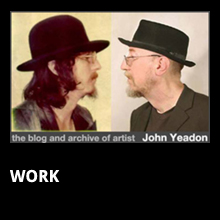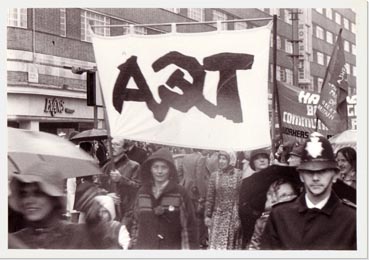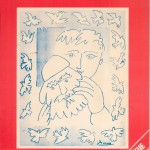That 70’s show ..
ARTERY 1971 – 1984 17 MAY – 23 JUNE 2012
Rob Tufnell @ 83 Page St London SW1P 4HA
An exhibition of Artery magazine’s archive and associated works by artists, musicians and directors including: Cinema Action, Rasheed Araeen, Conrad Atkinson, Alfreda Benge, David Binnington Michal Boncza, Bertolt Brecht and Ernst Ottwalt, Alan Bush, Peter de Francia, Peter Dunn and Loraine Leeson, The Hackney Flashers, Alexis Hunter, Peter Kennard, Alice Neel, Desmond Rochfort, Jeff Sawtell, Jo Spence, John Yeadon, Bob Starrett, Andrew Turner.
The first issue of Artery was produced following the ‘2nd Communist University’ organised by the Communist Party of Great Britain at the University of London Students’ Union on Malet Street during the summer of 1971. It featured papers resulting from the discussions and others looking to further the debate as to what could constitute a Socialist aesthetic.
Those responsible for the first issue were Colin Bibby and Jeff Sawtell, both students at the Royal College of Art, Rowan Roenisch who was studying Art History and Bonny Oberman a drama student. Limited to 100 copies it was produced on a mimeograph machine at the Royal College of Art. The second issue also included editorial input from Bill Sweeney, a student at the Royal Academy of Music, the sculptor Trudi Gurling and Andrew Turner from the Royal Academy. Turner was then to edit issue 5.
Artery changed format in 1973 in its sixth edition and became a ‘broad left’ publication under Jeff Sawtell with a further expanded editorial board whose new members included Desmond Rochfort and John Yeadon. Up until 1980 the magazine was printed on the Communist Party of Great Britain’s presses in Manchester and sold on shipyards, outside coal mines, in social clubs and independent bookshops, distributed by Central Books or directly on a sale or return basis. In 1980 when the masthead and format were altered and colour was introduced production shifted from Manchester to the Turkish Communist Party in exile’s Morning Litho on Morning Lane in Hackney (and later in Silvertown).
An editorial policy had the stated objectives to:
(i) To publish original and pioneer-works by Marxist theoreticians on aesthetics, art practice and politics; to reprint articles, pamphlets and extracts, now out of print, from the founders and developers of Marxism on all cultural theories and activities.
(ii To feature work whenever possible from the socialist world, the liberated ‘Third World’ and those fighting against Imperialism, that is both theoretical and practical.
(iii) To encourage and publish practical work by living Communist, Socialist and Progressive cultural workers in all the various disciplines.
(iv) To provide a platform for class-conscious working-class expression in the Arts.
(v) To earn for the magazine the active support of all those active comrades and progressive workers in the Labour movement who understand and see the necessity for such a journal.
(vi) To encourage all those active in the struggle against the inequalities of capitalist society to unite in the struggle for socialism, peace and international friendship.
The magazine had many notable supporters (both financially via its ‘Fighting Fund’ and in the form of its ‘Contributing Editors’) these included leading trade unionists, the composer Alan Bush, painter and Professor at the RCA Peter de Francia, the poet Hugh MacDiarmid, founder member of the Communist Party Andrew Rothstein, Bernie Steer of the Pentonville Five, William Morris scholar Ray Watkinson and musician Robert Wyatt. Eschewing any notion of an official art it celebrated works from both representational schools and a burgeoning conceptual tradition. It celebrated the social concerns of well known artists such as Vincent van Gogh, Francisco de Goya, William Hogarth and L.S.Lowry and the explicit Communism of the Constructivists, Max Beckmann, Käthe Kollwitz, Ferdinand Leger, René Magritte, Alice Neel, Pablo Picasso and Diego Rivera amongst many others.
In the 1980s, in response to the election of Margaret Thatcher, Artery expanded its reach into other media including theatre, cabaret, filmmaking and poetry publishing and was instrumental in the conception of ‘alternative comedy’ through the contributions of Alexei Sayle, Bill Monks and Jim Barclay.
The magazine ceased publication in 1984 as active contributors became dispersed and the Morning Star began to carry its own reviews of contemporary art.
For further information and images please email mail@robtufnell.com Exhibition open 12 – 6 pm, Thursday – Saturday and by appointment.
Next exhibition: ‘Panem et Circenses’ with works by Michel Auder, Guy Debord, Ian Hamilton Finlay, Richard Hughes, Corita Kent, Oliver Laric, Paul Lafargue, Mike Nelson and Décio Pignatari with Gilberto Mendes; 27 July – 4 August 2012.
This entry was posted on Thursday, May 3rd, 2012 at 2:25 pm
You can follow any responses to this entry through the RSS 2.0 feed.


